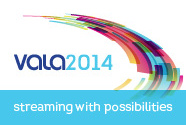https://drive.google.com/file/d/0BxlbeayLWxeRUklIOWZjRlFYbDQ/view?usp=sharing
Tag Archives: Accessibility
VALA2014 Session 4 Iezzi
The first accessible catalogue for the print-disabled community in AustraliaVALA2014 CONCURRENT SESSION 4: User Discovery and Experiences Tony IezziVision Australia Please tag your comments, tweets, and blog posts about this session: #vala14 and #s11 |  |
Abstract
The online catalogue from the Vision Australia Information Library Service provides access to specially prepared audio books, newspapers and magazines that can be read by any person with a print disability, using appropriate software and technology. All the titles use the latest technologies to enable people with a print disability to browse through a book, magazine or newspaper and easily use a table of contents, in much the same way as a sighted reader. Most of us take for granted the range of advanced search features in catalogues, yet only in the 21st century have these features finally become available in an Australian library service for the print-disabled community.

This work is licensed under a Creative Commons Attribution-NonCommercial License.
VALA2000 Session 12 Nevile
Persistent URL: http://www.vala.org.au/vala2000-proceedings/vala2000-session-12-nevile
On the web, universal content accessibility is not just browser compatibility.VALA 2000 CONCURRENT SESSION 12: Accessibility Liddy Nevile |
Please tag your comments, tweets, and blob posts about this session: #VALA2000
Abstract
The web content accessibility guidelines developed under the auspices of the World Wide Web Consortium (W3C), make clear that web accessibility is a matter of choice for publishers. Following the guidelines it is technically possible to produce exciting, accessible content including content that contains multimedia objects of many kinds. Understanding what is accessible and what is required to make content accessible is another matter. In this paper, a theoretical framework for user equivalence when working on accessibility is proposed and the wide-spread benefits of complying with guidelines are exposed. The disadvantages to many that result from failure to satisfy the guidelines are exemplified. Finally, a practical approach to accessible web development is proposed and resources for ensuring content accessibility are identified.
VALA2000 Session 12 Wallis
Persistent URL: http://www.vala.org.au/vala2000-proceedings/vala2000-session-12-wallis
Use of information technology for direct service provision to people with print disabilities.VALA 2000 CONCURRENT SESSION 12: Accessibility Leslie Wallis |
Please tag your comments, tweets, and blob posts about this session: #VALA2000
Abstract
RVIB Library and Information Services provide a range of services to people with print disabilities throughout Australia. Staff at RVIB are constantly researching and developing products which can provide users with improved and independent access to information. This paper discusses two initiatives which RVIB hopes will help revolutionize the way people with print disabilities access information. These initiatives are
- giving users the ability to order books while searching the library’s OPAC remotely and at the same time sample and access full text files of audio, braille and text formatted for large print and,
- the convergence of text, braille and audio files in one format or medium. The DAISY project – (Digitized Audio-Based Information System) integrates digital audio and text files on CD-ROM.
VALA2000 Session 12 Hyland
Persistent URL: http://www.vala.org.au/vala2000-proceedings/vala2000-session-12-hyland
TransAct: technology and the communityVALA 2000 CONCURRENT SESSION 12: Accessibility Margaret Hyland |
Please tag your comments, tweets, and blob posts about this session: #VALA2000
Abstract
This broadband project, the TransAct Trial, was the concept of the ACT Electricity and Water Authority Corporation (ACTEW). As a result of this trial, the ACT Department of Urban Services, the ACT Public Library and Information Service (ACTLIS) – that is one of the Department’s Agencies – and the University of Canberra, have been closely involved in the development of a number of related Internet sites, including an interactive site developed by youth in Aranda. The TransAct Trial has enabled ACTLIS to test new technologies for delivering information services and to explore different ways of working with sectors of the ACT community. Models have been established for ongoing links with education and with youth which can be applied to other community agencies and organisations. Outcomes for ACTLIS have been a cohesive website (which now requires redevelopment) and the need to develop marketing strategies to ensure that electronic services offered by ACTLIS are utilised to the maximum.
VALA2000 Session 15 Roberts
Persistent URL: http://www.vala.org.au/vala2000-proceedings/vala2000-session-15-roberts
Information literacy in the virtual libraryVALA 2000 CONCURRENT SESSION 15: Accessibility Susan RobertsReference Librarian, Swinburne University of Technology, Lilydale Campus |
Please tag your comments, tweets, and blob posts about this session: #VALA2000
Abstract
Multi-modal learning is a feature of educational provision at Swinburne University of Technology’s Lilydale Campus. Academic staff expect a high level of computer and information literacy from all students, and also have the expectation that library staff are well equipped to support this. To that end, library staff are responsible for the design, delivery and assessment of a module in a core subject that must be taken by all first year students, regardless of their course. This paper provides some background to this situation, looking first at the campus background, the nature of the library and its services, expectations of academic staff, and the library’s profile in course delivery. From our experiences at Lilydale campus, library staff have most definitely been called on to play a dynamic role.
